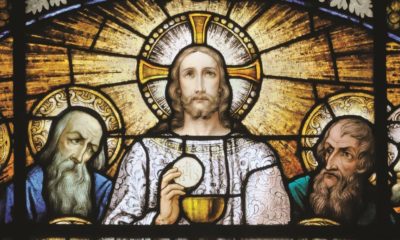The Solemnity of the Most Holy Body and Blood of Christ
June 19, 2022 — Year C
Readings: Gn 14:18-20 / Ps 110 / 1 Cor 11:23-26 / Lk 9:11b-17
by Rev. Nixon Negparanon, Pastor
I read this story told by Archbishop Fulton Sheen: that, during China’s 1911 republican revolution, in response to the earlier Boxer Rebellion, anti-Catholic militants seized a Catholic parish. They confined the parish priest to house arrest, so from his rectory window, he witnessed the desecration of the church. He knew that there had been thirty-two consecrated Hosts in the tabernacle.
An eleven-year-old girl was praying at the back of the church, and the guards either did not see her or else paid no attention to her. She returned to the church that night and made a holy hour and then consumed one of the sacred Hosts, bending down to receive Jesus on her tongue.
She continued to return every night, making a nightly holy hour and consuming one sacred Host. On the last night, the thirty-second night, unfortunately a guard was awakened. After she consumed the sacred Host, he chased her, grabbed her, and beat her to death with his rifle.
Archbishop Fulton Sheen became aware of her martyrdom while he was a seminarian. He was so inspired by her sacrifice that he promised to pray a holy hour before the Blessed Sacrament each day for the rest of his life.
Brothers and sisters, the eleven-year-old girl could have had no idea how she would influence a future bishop, who would in turn influence millions of people and promote Eucharistic adoration. We also have no idea how our witness and sacrifices influence other people.
Today we are celebrating the Solemnity of the Body and Blood of Jesus Christ. This feast reminds us that Jesus gives His very own body and blood, so that we might live in our faith and alive in our deeds. If we do not live in our faith and alive in our deeds, this is because the Body and Blood of Jesus are not part of our food. So let us not deprive ourselves of this most important ingredient of our earthly life.
When Catholic converts are asked to talk about the reason why they converted to the Catholic faith, for most of them, one of the main reasons is their discovery of the truth about the Holy Eucharist. When they learn that the Eucharist is not merely a symbol, but Jesus Christ Himself, given to us in the form of bread and wine, they begin to experience a deep spiritual hunger and longing for it. Our Catholic faith taught us that the Eucharist is Jesus Christ Himself.
Through the Eucharist, Christ becomes physically present in the church, keeping His promise that He would always be with us, until the end of the world. And, because the Eucharist is preserved in the tabernacle, we can be with Him any time we want, just like the eleven-year-old little girl in the story that I heard.
Whatever our spiritual condition may be, today’s feast of the Holy Eucharist is the greatest banquet of all. The greatest sacrifice of all. The very source and summit of our whole Christian life. This is the feast of us all, because Jesus is present in the Eucharist, and He is the Eucharist Himself, awaiting us all.
He is here for the child who receives his or her First Holy Communion, for Catholic converts, and for the lifelong believers like us Catholics. He is here for those who cannot receive him sacramentally: the little children, for the non-Catholics who are mysteriously drawn to the Eucharistic banquet. Some people or friends we know who are in the catechumenate program show love for the Eucharist and continue to attend Mass every week, even if they cannot receive Holy Communion, and they continue to pray in front of the Blessed Sacrament.
He is here for the sick people who cannot join us in this Eucharistic celebration because of their situation. That is why the Church reserves consecrated Hosts in the tabernacle, so that the Eucharist can be brought to the sick and the faithful who can worship the Blessed Sacrament outside of Mass.
So now the question is: How can be apply this belief of the real presence of Jesus in the Eucharist into our lives? There are so many suggested ways how, like Eucharistic devotion and participation in the exposition of the Blessed Sacrament as our thanksgiving, reparation, adoration, and petition to Christ, present with us in the Blessed Sacrament. We can also spend a few minutes after receiving the Eucharist in silent thanksgiving. We can visit our Lord preserved in the tabernacle. There, we can silently speak with Him about anything we please.
The Catechism of the Catholic Church sums up Eucharistic devotion in the words of Saint John Paul II: “Jesus awaits us in the sacrament of love. Let us not refuse the time to go to meet Him in adoration, in contemplation, full of faith and open to making amends for the serious offenses and crimes of the world. Let our adoration never cease.”
So Brothers and Sisters, in a few moments, when we receive Jesus in the Eucharist, let us try to remember our faith, not only in the Real Presence in the Host, but also Jesus’ real presence in us. That is why we are here, and that is why Jesus nourishes us, so that we can also nourish others.
At the end, let us remember this: If we celebrate the Eucharist with faith, we shall be transformed into what we eat. We shall become Christlike and be true to our name, “Christians.”
May Jesus Christ be praised.
 540-586-8988
540-586-8988 

